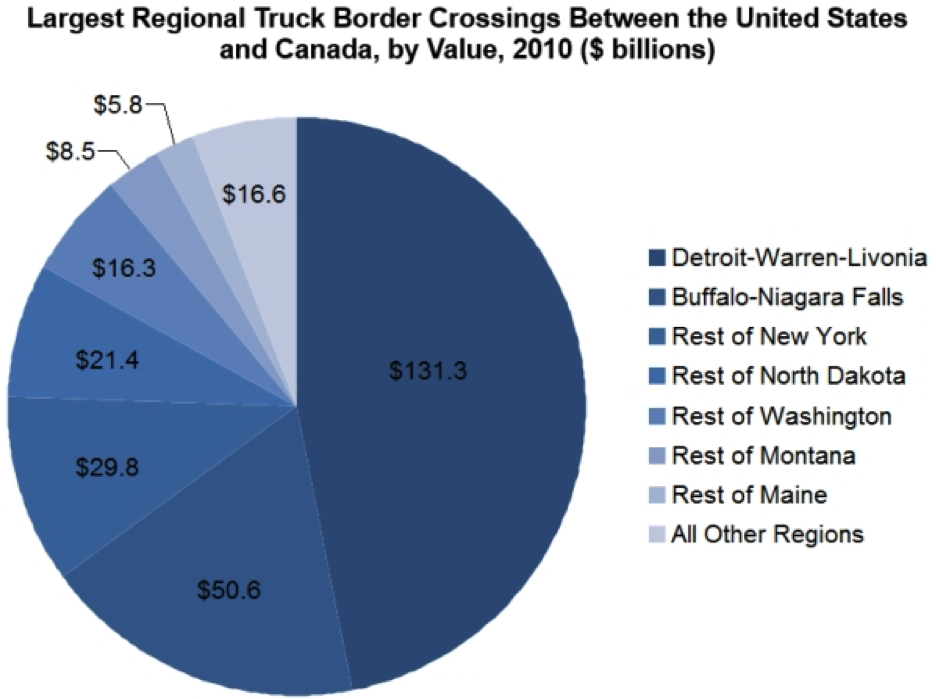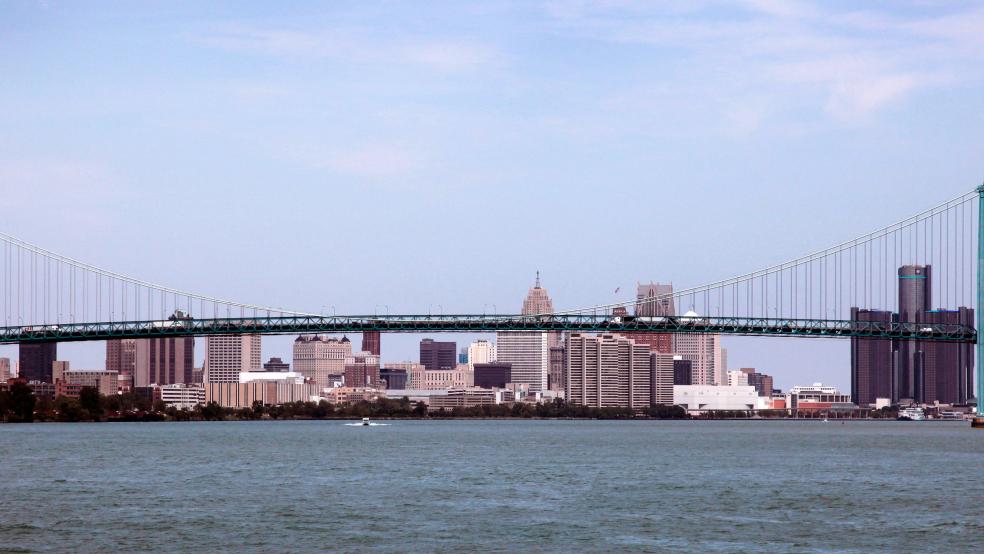Amid the gloom over the partisan deadlock in Washington over an infrastructure program and the Keystone XL pipeline, the U.S. and Canadian governments have quietly cut a deal on a new $2.1 billion bridge linking Detroit and Ontario designed to eliminate a massive bottleneck in the flow of goods between the two countries.
With more than $650 billion in goods exchanged each year between Canada and the United States, Canada represents this country’s largest trading partner, overshadowing China, Mexico and Japan. Nearly half of all goods that are transported between the two countries by truck each year – or roughly $131 billion worth – currently pass over the Ambassador Bridge or through an adjacent tunnel.
Related: Obama Says China’s Infrastructure Puts the U.S. to Shame
The 85-year-old Ambassador Bridge is swamped by over 8,000 trucks daily. A combination of heightened border security and persistent traffic jams is creating a drag on potential growth in U.S. exports and imports along the Detroit-Windsor border. Some experts say construction of a new bridge would pave the way for a significant increase in trade in coming years.
“Among all the border crossings between Canada and the United States, Detroit is really the most emblematic of the infrastructure problems that need to be addressed,” Joseph Kane, a senior policy specialist on U.S. metropolitan areas, said in an interview on Monday. “There’s a huge scale of value really going across the border, and it’s not just a local issue where it’s just benefiting local workers and business establishments in Michigan itself.”
The U.S. State Department approved the bridge in 2013, but the project has been dogged for years by financial and legal problems and challenges from community residents.
Related: How Tax Reform Could Help Save U.S. Infrastructure
The new bridge is to be constructed about two miles south of the Ambassador Bridge, a privately owned suspension bridge that currently is the busiest international border crossing in North America in terms of trade volume. The project also will include construction of new highway interchanges in downtown Detroit and Windsor to handle more easily the crush of traffic. Officials have said they hope to open the bridge in 2020, although construction hasn’t started yet.
The deal was finally sealed after the Canadian government agreed recently to pick up the $250 million to $300 million cost of a customs plaza for the New International Trade Crossing on the U.S. side. The Department of Homeland Security says that a “public-private partnership” will use tolls to reimburse Canada for the plaza’s construction. In return, the U.S. will pay for the workers, operations and maintenance of the plaza in Detroit – with a first year cost of about $100 million.
Much of the $131 billion worth of cargo transported by truck between Detroit and Windsor annually is high-value transportation and electronic equipment that is destined for regions well beyond Detroit and Ontario. By comparison, the next highest volume border crossing, in Buffalo, N.Y., handles about $151 billion of truck traffic a year, or one third of what is trucked across the Ambassador Bridge, according to data prepared by Brookings.

Source: Brookings analysis of EDR data.
Uncertainties have dogged the new bridge project for years. Detroit-area billionaire Manuel “Matty” Moroun, the owner of the Ambassador Bridge, mounted a vigorous legal and political campaign to try to block the project. He and the other owners complained that they stood to lose as much as two-thirds of their business.
Related: Obama Is Using Detroit as a Political Punching Bag
Meanwhile, residents from nearby Southwest Detroit communities challenged the project in court, saying that it would destroy their neighborhoods and spoil the environment. The residents’ challenges came to the end last week when the U.S. Supreme Court refused to hear an appeal.
The U.S.-Canadian agreement to move ahead with the new bridge was hailed by federal officials and Michigan lawmakers as a major breakthrough and boon to Michigan’s struggling economy.
The announcement of the final deal also came at a time when the Obama administration and congressional Republican leaders are at loggerheads over ways to fund a new highway and mass transit program before temporary spending runs out this spring, and whether to move ahead with the Keystone pipeline between Canada and the U.S. Gulf Coast.
Top Reads from The Fiscal Times:


